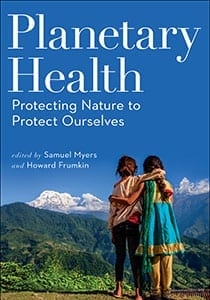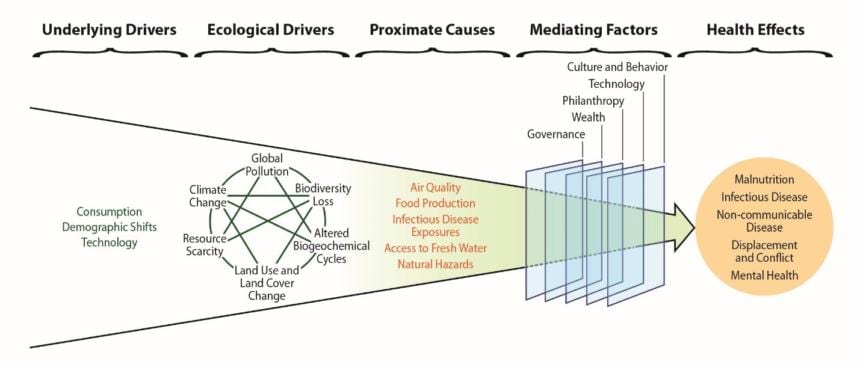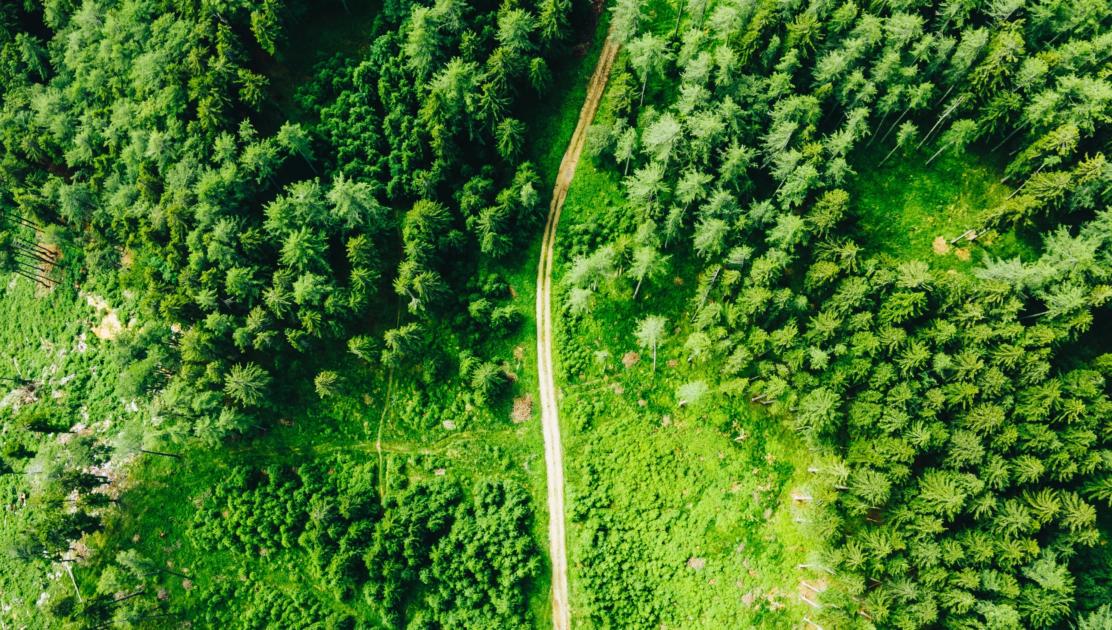Planetary Health: Protecting Nature to Protect Ourselves
By Garrison InstituteThe Garrison Institute Forum on Pathways to Planetary Health was pleased to host Dr. Sam Myers, MD, MPH on Thursday, August 6 at 2:00pm EDT. Dr. Myers is the Founding Director of Planetary Health Alliance. Garrison Institute Co-founder Jonathan F. P. Rose and Dr. Myers discussed the rise of the field of Planetary Health, as well as his new book, Planetary Health: Protecting Nature to Protect Ourselves which he co-wrote with Howard Frumkin. The below excerpt is from a section of the book entitled A Bright Future for Planetary Health.

On September 23rd, 2019, sixteen-year-old Swedish climate activist Greta Thunberg addressed world leaders who had come together for the UN General Assembly. “This is all wrong,” she told them. “I shouldn’t be up here. I should be back in school on the other side of the ocean. Yet you all come to us young people for hope? How dare you! You have stolen my dreams and my childhood with your empty words. And yet I’m one of the lucky ones. People are suffering. People are dying. Entire ecosystems are collapsing. We are in the beginning of a mass extinction. And all you can talk about is money and fairytales of eternal economic growth. How dare you!” She continued: “You are failing us. But the young people are starting to understand your betrayal. The eyes of all future generations are upon you. And if you choose to fail us, I say we will never forgive you. We will not let you get away with this. Right here, right now is where we draw the line. The world is waking up. And change is coming, whether you like it or not.”
And so here we find ourselves at a pivotal moment in human history. After millions of years of biological evolution and thousands of years of social evolution we have, in the blink of an eye, multiplied our numbers and our consumption of resources to the extent that we imperil the natural systems that support us and all living beings. Our wealth, health, education, and opportunities exceed anything we have experienced before, but they have been carried forth on the groaning back of a crumbling biosphere.1 Our current trajectory leads to ecological collapse and the unravelling of our many gains. Now the eyes of all future generations are upon us, and, within a few decades, we must chart a new course from extinction to renaissance. We are a community forged in urgency.
In the face of these challenges, hope can seem elusive. Many earth system trends are grim, the popular and scientific literature is full of apocalyptic scenarios,2,3 and progress to date has been slow. But as Thunberg and so many in her generation are emphasizing, we have a choice. Within our reach is a future that sparkles with promise, in which humanity has never been healthier, better educated, or happier, and in which opportunities are more accessible than ever before to people of every gender, race, ethnicity, and religion.
The chapters of this book have presented core elements of a world that we would be proud to bequeath to Greta Thunberg and her generation, and that they might be glad to inherit. In it, the human population has stabilized and then started to decline as a natural result of the demographic transition. Food is produced much more efficiently, with lower inputs of land, water, agrochemicals, and energy. Energy is produced renewably in a post-combustion world in which CO2 levels are beginning to decline. People are living mostly in cities designed to optimize their health, both physical and mental, encourage social connectedness and minimize their ecological footprints. With each passing decade there is more room, not less, for the rest of the biosphere. Human wellbeing is on the rise, and we are living in harmony with the natural world.

Figure 1.4
Schematic illustrating impacts of anthropogenic change on human health. Driven by rapid population growth, even steeper growth in per capita consumption, and technologies with large environmental impacts, the scale of human activity now outstrips our planet’s capacity to absorb our wastes or provide the resources that we are using sustainably. As a result, we are transforming and disrupting most of our planet’s natural systems. Those disruptions interact with each other in complex ways to alter the fundamental conditions for human health and wellbeing and, ultimately, affect nearly every dimension of human health.
Order a copy of Planetary Health: Protecting Nature to Protect Ourselves today. Use the discount code PLANET for 20% off the book price on the Island Press website.
* * *
Samuel Myers, MD, MPH studies the human health impacts of accelerating disruptions to Earth’s natural systems, a field recently dubbed Planetary Health. He is a Principal Research Scientist at the Harvard T.H. Chan School of Public Health and is the founding Director of the Planetary Health Alliance (www.planetaryhealthalliance.org). Sam received his BA from Harvard College, MD from Yale University School of Medicine, and MPH from the Harvard TH Chan School of Public Health. He performed his internal medicine residency at UCSF and is Board Certified in Internal Medicine.
Sam’s current work spans several areas of planetary health including 1) the global nutritional impacts of rising concentrations of CO2 in the atmosphere; 2) the health impacts of land management decisions in SE Asia associated with biomass burning and particulate air pollution 3) the global consequences of fisheries decline for human nutrition and health; 4) the global impact of animal pollinator declines on human nutrition today and in the future; and 5) the impact of climate shocks on human nutrition as mediated through global food trade. As the Director of the Planetary Health Alliance, Sam oversees a multi-institutional effort to support research, education and policy efforts around the world focused on understanding and quantifying the human health impacts of disrupting Earth’s natural systems and translating that understanding into resource management decisions globally. Dr. Myers serves as a Commissioner on the Lancet-Rockefeller Foundation Commission on Planetary Health, the Lancet Commission on Arctic Health, and a member of the Lead Expert Group of the Global Panel on Agriculture, Food Systems, and Nutrition. He was the inaugural recipient of the Arrell Global Food Innovation Award in 2018. He has also been awarded the Prince Albert II of Monaco—Institut Pasteur Award for research at the interface of global environmental change and human health.
